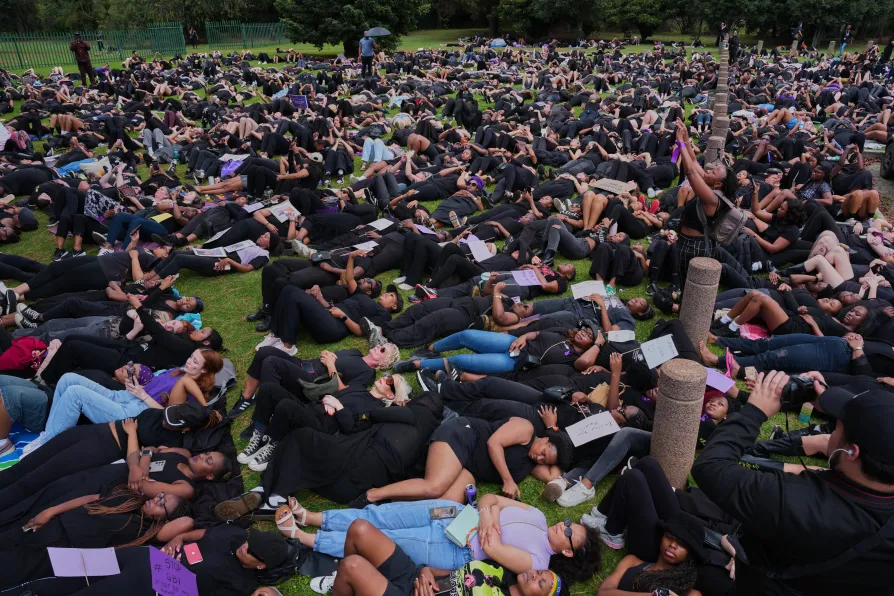
 Participants lie on the ground during a gender-based violence protest at the forecourt of the botanical gardens in Johannesburg, South Africa, November 21, 2025
Participants lie on the ground during a gender-based violence protest at the forecourt of the botanical gardens in Johannesburg, South Africa, November 21, 2025
SOUTH AFRICA has declared violence against women a national disaster after an online campaign culminated in protests across the country today.
Women were urged to “withdraw from the economy for one day” and lie down for 15 minutes at noon in honour of the 15 women murdered daily in the country.
The government had initially refused to grant the classification but reversed its position after assessing the “persistent and immediate life-safety risks posed by ongoing acts of violence.”
South Africa has some of the highest levels of gender-based violence globally, with women killed at a rate five times the world average, according to UN Women.
Today’s “lie downs” took place in 15 locations, including Cape Town, Durban and Johannesburg, with allies in Eswatini, Kenya and Namibia joining in.
Demonstrators wore black for “mourning and resistance” as part of the action dubbed the G20 Women’s Shutdown, organised by Women for Change.
The group also led an online campaign where many people, including celebrities, changed their social media profile pictures to purple.
The new categorisation allows departments to use existing budgets to “implement every measure possible” to curb the violence.
Additional online -
Women for Change welcomed the news on Instagram, telling its followers “we have won” and that their “persistence has been recognised.”
“We have written history together [and] we have finally forced the country to confront the truth,” it said.
Before the announcement, spokeswoman Cameron Kasambala told the BBC that “so many beautiful acts and legislations” had been followed by “lack of implementation and transparency” on the government’s part.
“We’ve integrated violence into our culture [and] into our social norms,” she said.
“Once the government truly reacts to this issue, I feel like we’ll already be able to see a reaction on the ground. Because they set the precedent and the tone for how the country responds.”
Lynette Oxeley, the founder of Girls on Fire, which helps women protect themselves through gun ownership, said the group was formed as women feel the government has not done enough, and so they have taken matters into their own hands.
It is legal to own a firearm in South Africa for self-defence if a person has a valid licence.
Most of the women in the group have been raped, attacked, robbed, or experienced some level of violence.
Prudence, who joined the group after she was raped in 2022, said: “I said: ‘No.’ I screamed, I cried but he didn’t take no for an answer.
Trying to find justice was an “uphill battle,” she said, as her case was withdrawn because her rape kit was lost.
She told the BBC that it is not a “police problem, it is a nation problem.”
Although the women are trained to shoot firearms, Ms Oxeley said using a gun was a “last resort.”
“It’s not about actually defending yourself with a firearm,” she said.
“I want ladies to change what they think about themselves. Stop being silent.
“Even if you do not win the fight, at least you are fighting back.”

Austerity in a red tie is still austerity, warns RAMONA McCARTNEY of the People’s Assembly – rally with us to demand different choices

SALEEM BADAT and VASU REDDY introduce a new book about an outstanding interpreter of the world, and an activist scholar committed to changing society












